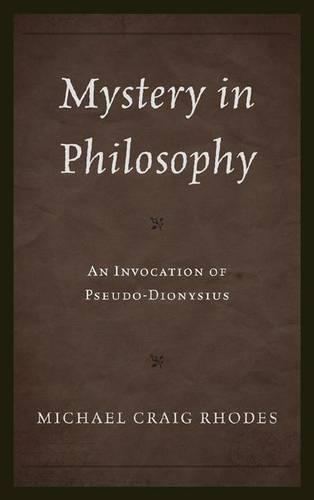
Mystery in Philosophy: An Invocation of Pseudo-Dionysius
(Paperback)
Publishing Details
Mystery in Philosophy: An Invocation of Pseudo-Dionysius
By (Author) Michael Craig Rhodes
Bloomsbury Publishing PLC
Lexington Books
12th March 2014
United States
Classifications
Professional and Scholarly
Non Fiction
Ancient Greek and Roman philosophy
Philosophy: metaphysics and ontology
210
Physical Properties
Paperback
142
Width 157mm, Height 228mm, Spine 11mm
231g
Description
Typically, mystery does not receive much attention in philosophy. Although Heidegger and other key philosophers have made a place for mystery in philosophy, many find such philosophizing suspect and unconvincing. As a general rule, contemporary philosophers have taken a different approach, and, thus, there has been very little discussion of mystery in philosophy. As a study of mystery in philosophy, this book is therefore somewhat unique. Moreover, it is also distinctive in the way it approaches the subject, tuning to an unpopular figureDionysius the Areopagite (c. 500)in contemporary philosophy in effort to make connections between that form of thought and various claims and indications of mystery. Thus, the book is unconventional in terms of both its subject matter and its methodology.
Reviews
In this short but ambitious book, Michael Craig Rhodes makes a persuasive case for the philosophical rehabilitation of the neglected notion of an ineffable mystery. Through an original discussion of the great early champion of negative theology, Pseudo-Dionysius, Rhodes develops a rich and attractive concept of being as an ikon of transcendent mystery. The value of this concept is then established by showing how it is presupposed in some of the best modern contributions to the philosophies of mind, matter and language. Theologians and philosophers alike will welcome this challenging book. -- David E. Cooper, Durham University
The last century saw a return of the mystical, especially in Wittgenstein who spoke of the mystical, as that of which one cannot speak, but which also shows itself. Michael Craig Rhodes in this remarkable book seeks inspiration for the future of philosophy in the vision of the mysterious figure of the early sixth century who wrote under the name of Dionysios (or Denys) the Areopagite. From his starting-point in Wittgenstein, Rhodes leads us to Denys understanding of what he calls being-as-ikon, that is, being as disclosing the ultimate, God as unknowable. He makes this theme central to his development of the notion of the mystical, in which he brings philosophers of the analytical traditionColin McGinn, David Cooper and Shimon Malininto dialogue with giants of the continental tradition of hermeneutical philosophy such as Heidegger and Merleau-Ponty, and also draws into his discussion scientists and philosophers of science such as Weinberg, Heisenberg and Feyerabend. Descartes emerges as a surprisingly central figure. His argument leads us through reflections on ontology, linguistics, and aesthetics. It is a book that is in many places inspiring and always thought-provoking. -- Andrew Louth, University of Durham
Author Bio
Michael Craig Rhodes is dialogue lecturer at North Park University.
